The Farm at Stonehill
Donor Impact Report
2024/25 Growing Season, Activities and Milestones
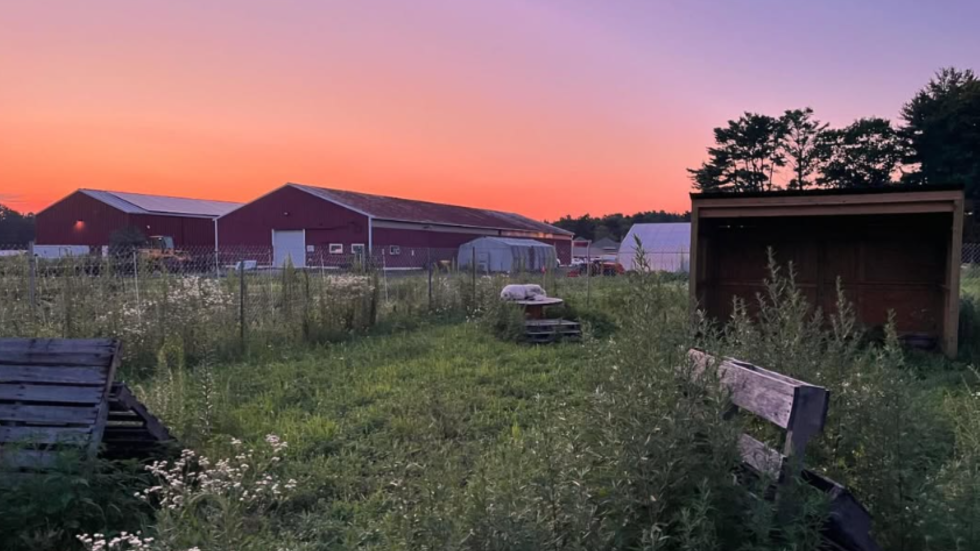
Grown from a desire to address food insecurity in our communities
The Farm at Stonehill is an initiative of the May School of Arts and Sciences and seeks to live out the college’s mission by:
- Helping those in need, providing access to fresh, nutritious, locally grown food to area food pantries, meal providers, health clinics and resource centers.
- Enriching Stonehill academic and service endeavors by engaging in environmental, social and food justice.
Farm Overview
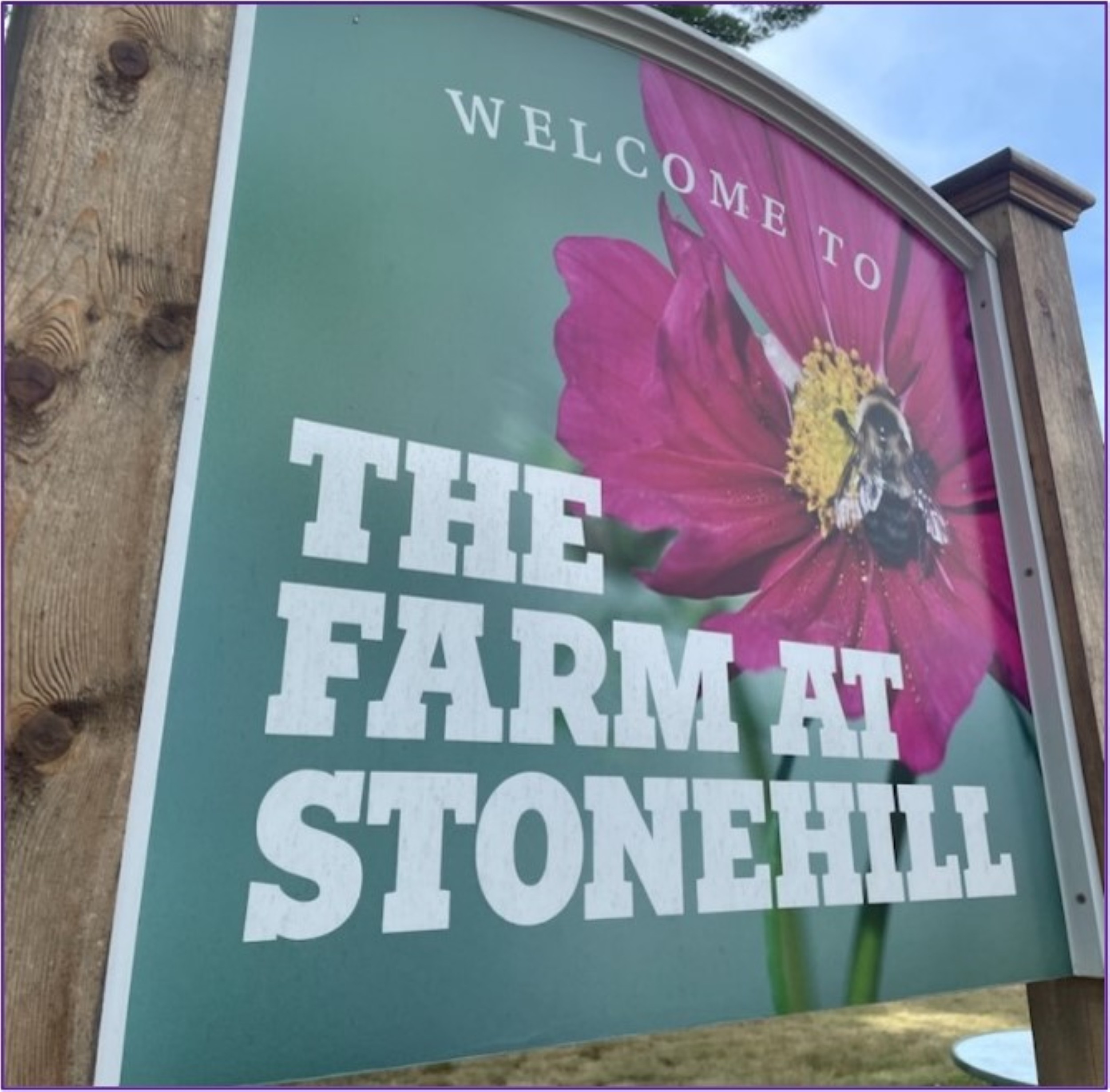
Grown from a desire to address food insecurity in our communities, The Farm at Stonehill was created in 2011 after former Vice President for Mission and faculty, Paul DaPonte, was inspired following a day of service in our neighboring city, Brockton, MA. He and several Stonehill students accompanied residents with limited access to healthy food and fresh produce, and a desire to help address food insecurity was born.
The Farm yields 10,000 to 12,000 lbs. of fresh, organic produce each year on nearly 2 acres of land. Many varieties of vegetables, fruits and flowers are grown at the Farm and include popular items like potatoes, onions, beans, greens, strawberries, basil and sunflowers. Vegetable varieties are chosen based on nutritional value and popularity among recipients, who are surveyed each season.
The Farm has developed a number of community partners over the years including: My Brother's Keeper; Father Bill’s & MainSpring, the Old Colony Y’s David Jon Louison Center, and The Easton Food Pantry. The Mobile Market launched in 2016 in partnership with Brockton Neighborhood Health Center (BNHC) and today this partnership remains strong. The Farm at Stonehill continues the mission of helping those in need by offering access to nutrition with fresh, seasonal produce. We utilize the Mobile Market as a tool to bring access to nutrition to food apartheid areas of our greater community.
The 14th Season Snapshot
Donated or sold at accessible prices
Reflections On Our 14th Season
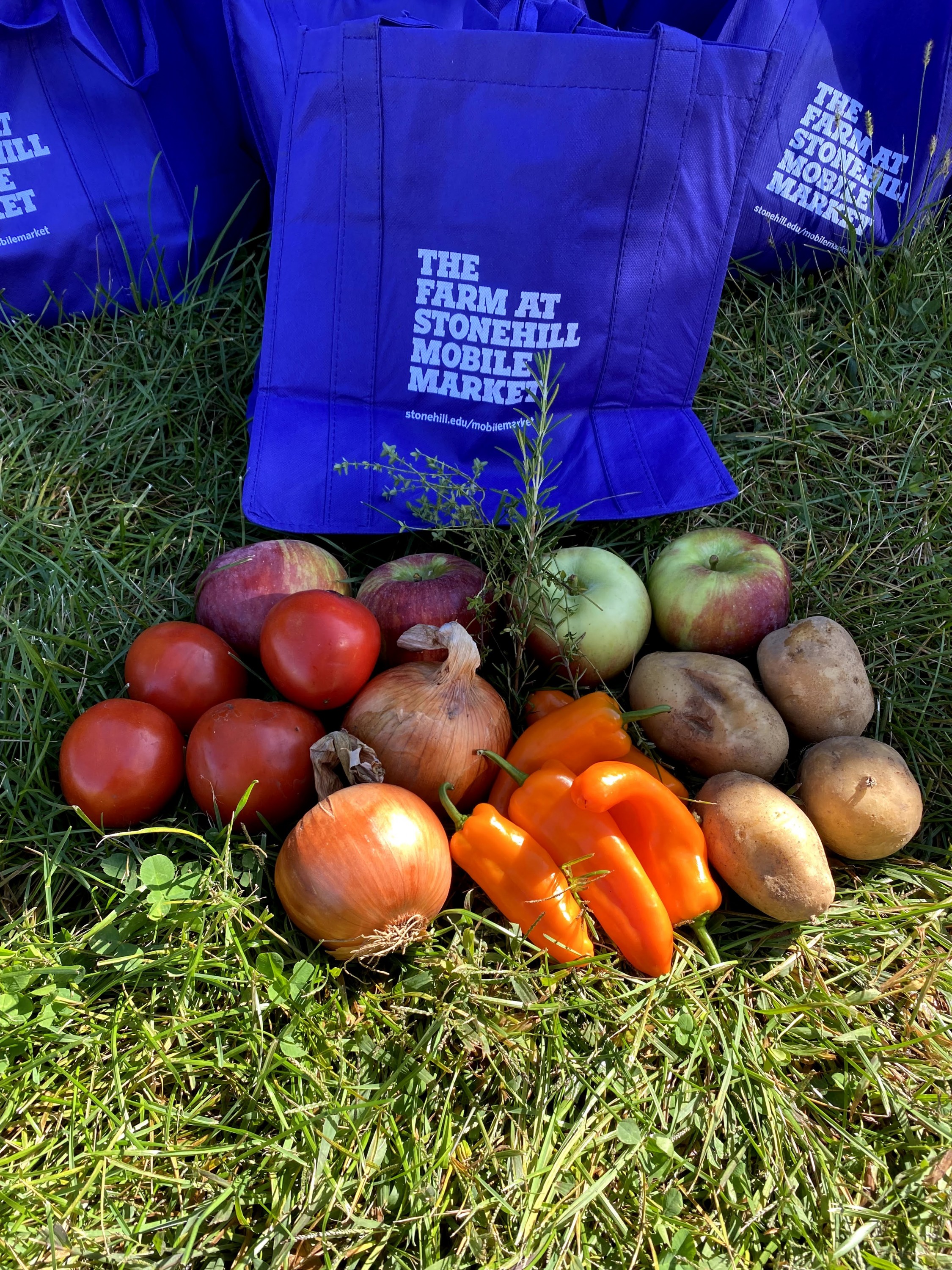
The summer of 2024 started out beautifully! We had an early spring and therefore everything was planted by early June and we were in a great position for summer growing season. Mid-summer began a few strong heat waves that attracted some unwanted pests and caused a decrease in potato, beans, and tomato yields.
However, it also brought learning experiences and educational opportunities. We dug deep into integrated pest management techniques and tried our best to farm with nature. By design, the Farm’s elevated growing beds and minimal tillage system help us stay focused on watering only the plants.
Using leaves and clippings from campus, we are able to mulch in our walking paths, keeping weeds at bay, organically. Some vegetables loved the heat (e.g. eggplant, peppers, and corn), while others suffered (e.g. potatoes and tomatoes).
Every summer we grow something you won’t find in the grocery store. Our lemon cucumbers, kohlrabi, and tomatillos were a big hit with our customers this summer. Special thanks to Holly Perdigao (Environmental Studies ‘26) for giving them extra care through the more trying moments of the season.
Despite some extreme weather, my third season on the Farm felt like our best season yet! We were growing much more than produce; we are growing a revolution of community-based intelligence, hope, and a thriving local food system. Year after year, we learn and grow as our favorite crop to cultivate is HOPE for healthy relationships with our partners and funders as your support for the work we do for our community is invaluable.
Growing Infrastructure
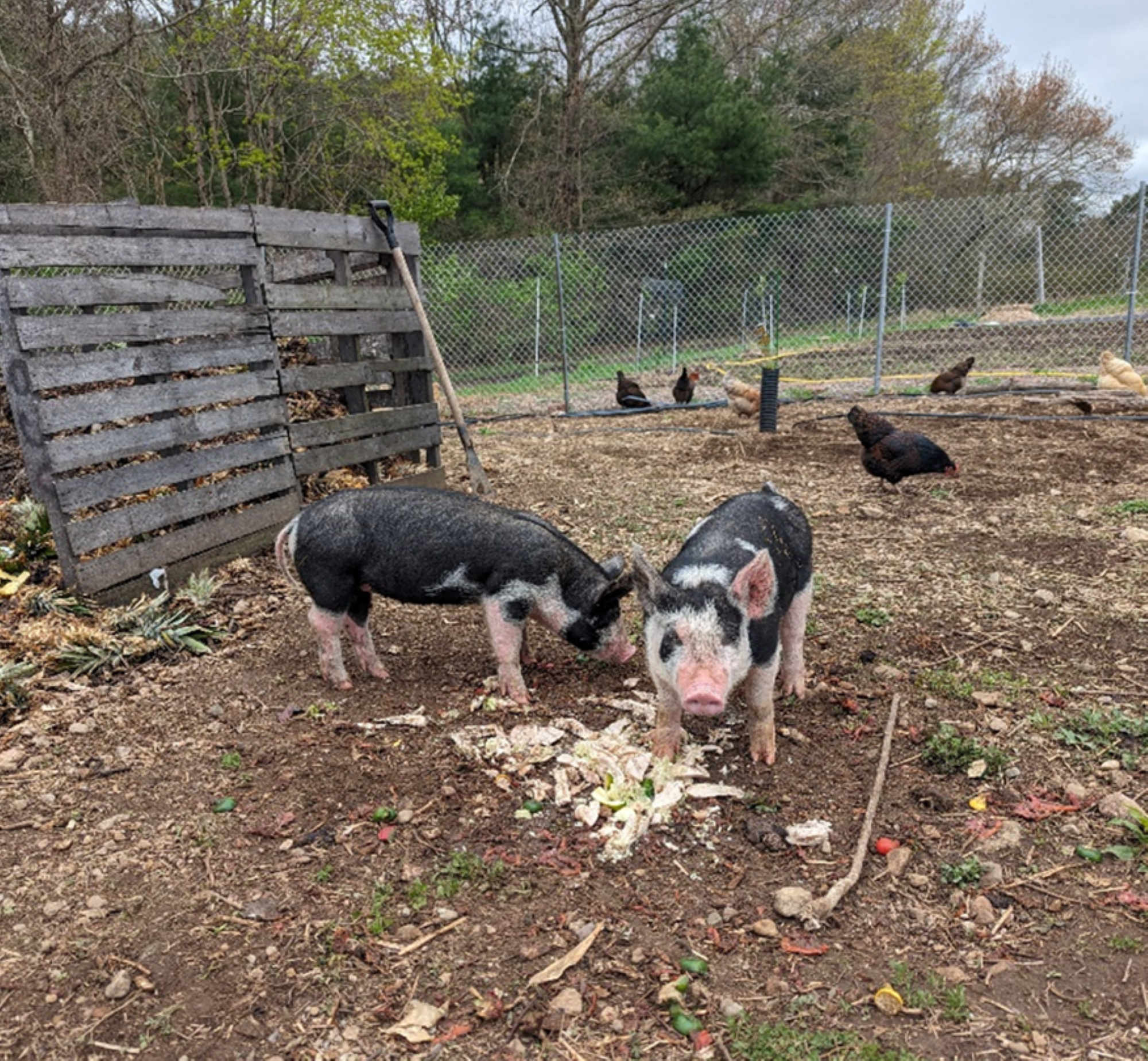
We incorporated pigs into the system. The two little piglets came to the Farm last April and consumed all our campus food waste as well as brought us the gift of organic fertilizer and a wonderful source of protein without much input.
We continue to have laying hens as they also provide a sustainable protein source with their eggs and consume some fresh food waste from the dining commons and feed us with their quirky humor and nitrogen-rich manure for onsite fertilizer. The animals help us close an important nutrient loop for the Farm as well as bring much joy!

Our incredible beekeeper, Kevin O’Donnell, helps keep our honeybees happy and provided over 200 pounds of honey this year. Much of it was sold as a fund raiser to United Way and given to folks attending farm tours. Our honey is also sold as a fundraiser for The Farm through The Skyhawk Shop in The Thomas and Donna May School of Arts & Sciences and through our farm’s online store.
Growing Intelligence
During Summer 2024, we enjoyed the collective knowledge of four students. Students who work on the Farm and with our Mobile Market do more than grow and sell fresh, organic produce. They grow intelligence, friendships and community while serving folks of all ages.
Together we supported and helped one another through the best and worst of days. We set morning intentions and enjoyed completing our days with a reflection of what we learned, experienced and felt.
2024 Summer Farmer Community
Holly Perdigao
Salvatore Amico
Jesie Cruz
Intern Jesie Cruz '25 on Farm Tour with Sabura Summer Camp
Chickens and dogs at The Farm
Growing Community
The Farm at Stonehill continues to serve as both a gathering space for staff, students, faculty, and community partners, as well as a means for Stonehill to reach deeper into our community to serve those in need. Highlighted below are just a few of the ways that the Farm at Stonehill grew community in 2024:
- The Farm welcomed alumni, parents and families for annual Homecoming Weekend Farm Tours.
- We welcomed many First Year Experience (FYE) classes for an introduction to the Farm. Led by Director of First-Year Experience and Leadership Development Father Tim Mouton, C.S.C. and several staff and adjunct faculty, FYE came across the street for a farm experience.
- The football team came for an end-of-season volunteer service and team building.
- The Farm co-hosted events with Intercultural Affairs and the Center for Race, Ethnicity and Social Justice.
- We experienced growing community with the Brockton Neighborhood Health Clinic (BNHC) every Wednesday for $2 bags of fresh, nutritious and colorful produce through our Mobile Market. We offered a variety of staple crops and items to fresh at-home cooking, as well as tested the waters with uncommon items like Kohlrabi. In the beginning we had a lot of explaining to do! What is this thing? You can eat that? How do you prepare it and what does it taste like? With some funny looks, a little trust, and lots of laughs, friendships developed every week and we now have requests for this funky-looking, tasty crucifer called kohlrabi.
- Thanks to grant support, we were able to do critical fixes to our Mobile Market van and purchase supportive fruit and veggies from neighboring farms in our efforts to supply access to better nutrition for our communities in need.
- Farm Fridays continue to be the best way to bring a variety of volunteers to visit the Farm year-round. We open every Friday from 2pm - 4pm for volunteering. This time is open for students, staff, and faculty to come offer their service in friendship.
- The Annual Harvest Party, co-hosted with the Environmental Science Department, offered a time for students to mingle, paint or carve a pumpkin and enjoy locally produced treats.
The Farm as a Classroom
The Farm service hours support learning and provide hands-on experiences as many different classes visited us this year.
- Professor Corey Dolgon’s Introduction to Sociology students volunteered on The Farm as each student in the class must choose an organization in the community, earn 15 hours of community service, present their experience and write a final paper.
- Professor of English Sarah Graycomb’s Moreau Honors students spend a couple significant times a year volunteering on The Farm to learn skills and spend time together as an Honors program.
- Associate Professor of Communication Monique Myer’s Happiness and Communications class comes to the Farm for a tour and will spend another class harvesting and packing nearly 60 lbs. of produce for homeless shelters in the community. Together, we donated to the David Jon Louison Family Shelter and the Bolton Place Family Shelter.
- Laurie serves as both the Farm Director and Adjunct Faculty in Environmental Science Department. Her classes include Sustainable Agriculture and Principles of Environmental Science. She brings her classes to the farm often for hands-on learning and living laboratory opportunities. We also have fun making salsa, fire cider, and in the late fall, the students take soil samples and help clean up irrigation lines.
- Professor of Religious Studies Father Stephen Wilbricht, C.S.C. brings his religious studies classes annually for a farm tour, weeding, pruning, and trellis work as we continue to improve our vineyard for small batch wine-making for Commencement Eucharist.
- Assistant Professor of Studio Arts Candice Smith-Corby's class grew flowers for natural colored dyes and garments revived with natural farm colors!
Cultivating our 15th Season in 2025
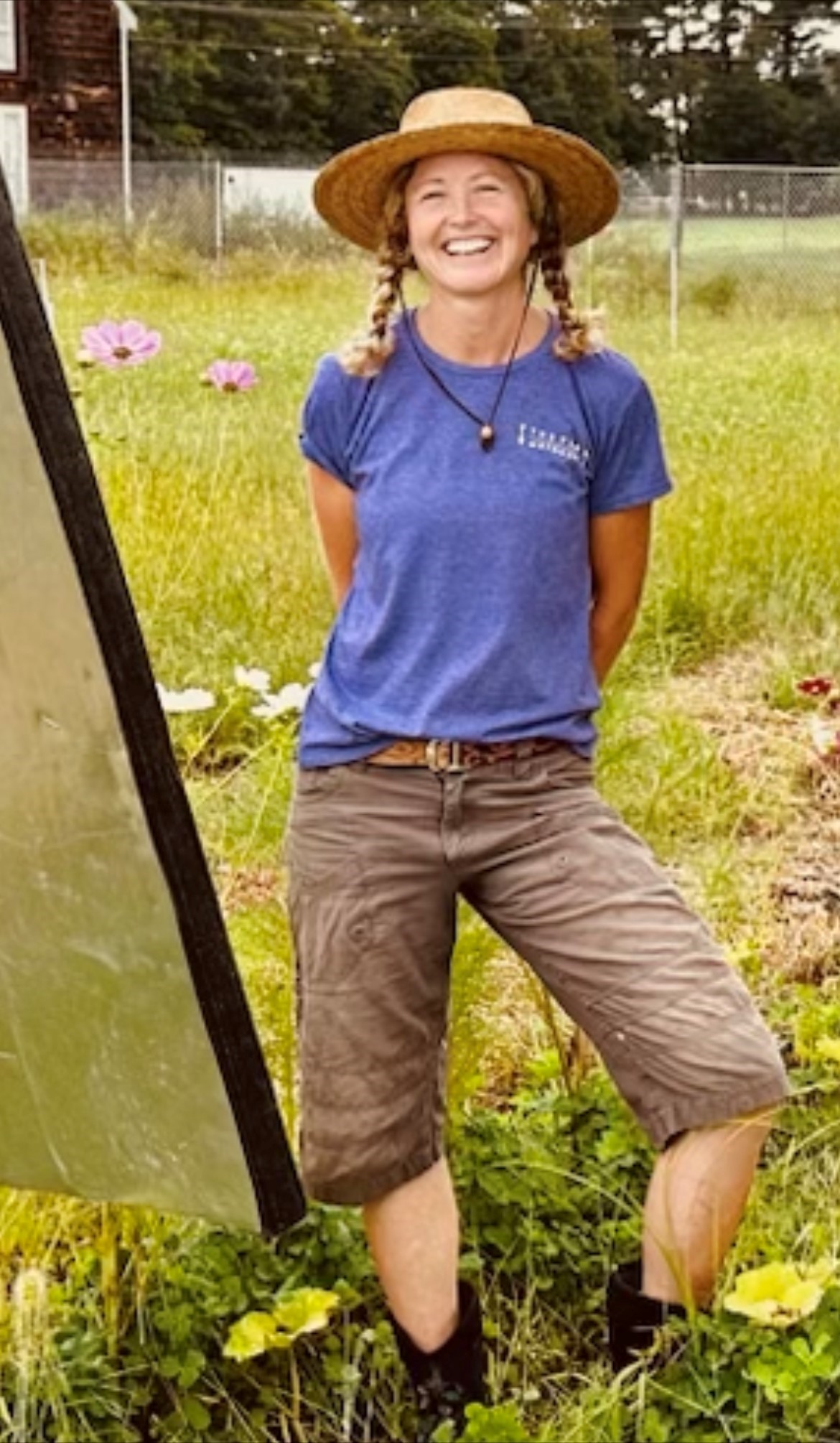
With every year, we learn from the last. The 2025 Growing season will remain fallow as I pursue a PhD in Agroforestry. However, before I depart we have been busy sowing seed for vegetable transplants with my Food Justice class and Farm Friday volunteers. We plan to donate the vegetable starts to community gardens and food justice organization in the greater Easton area. This will allow students to learn the process of starting a vegetable plant from seed and perhaps even bring it to their own home garden this season.
As we strive to maintain and support biodiversity on the Farm with nature as a philosophy and practice we will plant a overcrop this spring to let the fields rest and lay fallow. This offers multiple benefits of reducing weed pressure, increasing soil nutrients and preventing any soil and wind erosion while the fields lay fallow.
The Farm will remain a sanctuary for birds, bees and butterflies, as well as science based projects such as trail cams tracking wildlife and counting bee species. Our goals of better understanding site entomology by provide necessary habitat for beneficial insects and pollinators will remain strong this season. This perspective allows a natural food web to thrive with healthy ecosystem services.
It is with deep gratitude, we thank you for your continued support and dedication to our program.
Support The Farm
Thank you for making a gift in support of the Farm at Stonehill!